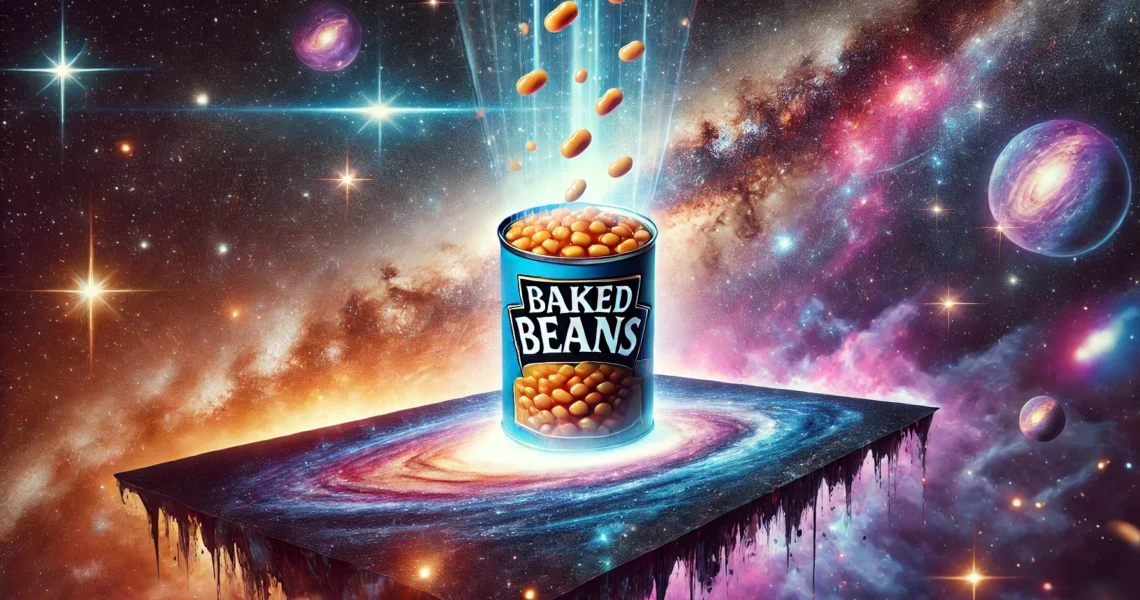Can Dogs Eat Baked Beans?
Are baked beans a safe option for your pet?
Baked beans are a staple in many households, enjoyed as a comforting side dish or a hearty snack. But if you have a dog, you may find yourself asking, “Can dogs eat baked beans?” As responsible pet owners, it’s essential to ensure the foods we share with our furry friends are safe and healthy.
No, dogs cannot eat baked beans. These popular canned beans often contain ingredients that can harm your pet, such as high levels of sugar, salt, and sometimes onion or garlic, which are toxic to dogs and can lead to serious health problems like obesity, dehydration, digestive issues, and even life-threatening conditions such as haemolytic anaemia or kidney failure.
What Are Baked Beans?
Baked beans are a popular dish made primarily with navy beans, a small white bean known for its creamy texture. These beans are slow-cooked and coated in a thick, sweet, and tangy sauce, often made with ingredients such as molasses, brown sugar, tomatoes, and spices. Popular brands like Heinz baked beans are loved for their rich flavour, but they include sugar, salt, and sometimes onion or garlic powder—ingredients that are harmless to humans but can pose risks to dogs. The sauce also frequently contains vinegar and preservatives, which add to its appeal for human palates but make it unsuitable for pets.
Commercial baked beans are designed to be a flavourful accompaniment to meals, often containing added fat and seasoning. While humans can enjoy these indulgent touches, the high levels of sugar and salt in baked beans are far from ideal for dogs, whose bodies are less capable of processing such rich and heavily seasoned foods.
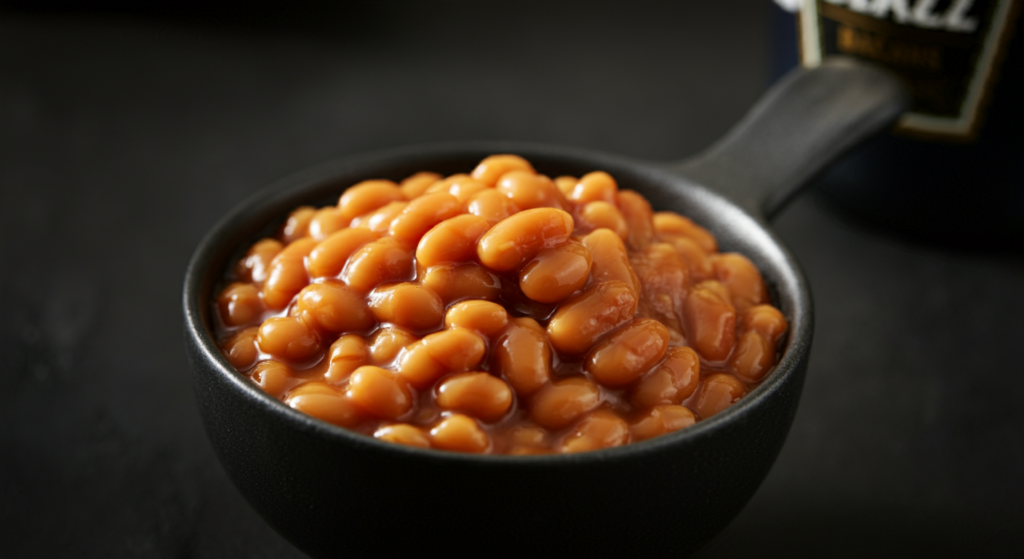
Can Dogs Eat Baked Beans?
While dogs may beg for a taste, baked beans are not a safe treat for them. The high sugar content can contribute to obesity, while excessive salt can lead to dehydration and even kidney issues. Additionally, ingredients like onions and garlic are toxic to dogs.
Nutritional Analysis of Baked Beans
Baked beans contain:
- Protein: Beneficial but unnecessary given the harmful additives.
- Fibre: Good for humans but overshadowed by sugar and salt.
- Sugar: A leading cause of obesity in dogs.
- Salt: Dangerous in large quantities.
- Onions and Garlic: Toxic to dogs.
Nutritional Table (Per 100g of Baked Beans)
| Nutrient | Amount | % RDA for Dogs |
|---|---|---|
| Protein | 4.6g | Moderate |
| Fibre | 3.7g | Moderate |
| Sugar | 5.7g | Excessive |
| Salt | 0.6g | Excessive |
| Onions/Garlic | N/A | Toxic |
Can Dogs Eat Baked Beans? Detailed Explanation
Baked beans are high in sugar and salt, which can cause obesity and dehydration. Onions and garlic, often found in the sauce, are toxic and can lead to serious health issues. While the beans themselves provide protein and fibre, the harmful additives make them unsuitable for dogs.
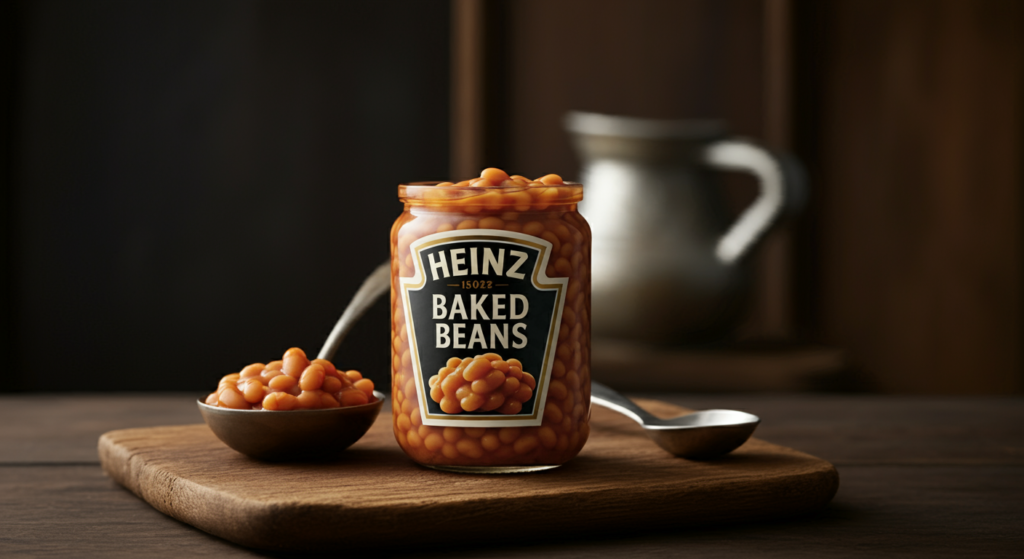
Risks of Feeding Baked Beans to Dogs
Are baked beans bad for dogs? Absolutely. While they may seem harmless at first glance, feeding baked beans to your dog can pose several serious risks to their health:
Obesity:
Baked beans are often packed with sugar, which can quickly contribute to unnecessary weight gain in dogs, especially if consumed regularly. Obesity in dogs is a significant health issue that can lead to other problems such as joint pain, reduced mobility, diabetes, and heart disease. Dogs require a carefully balanced diet, and foods high in sugar can upset this balance.
Digestive Issues:
The spices, preservatives, and seasonings commonly used in baked beans can irritate a dog’s digestive system, causing symptoms such as vomiting, diarrhoea, or gas. These ingredients are not part of a dog’s natural diet and can disrupt their gastrointestinal tract, leading to discomfort or more serious conditions if consumed frequently.
Toxicity from Onions and Garlic:
Many baked bean recipes contain onions, garlic, or onion powder as flavoring agents. These ingredients are toxic to dogs and can damage their red blood cells, leading to a condition called hemolytic anemia. Even small amounts of these ingredients can cause serious health issues, such as weakness, lethargy, rapid breathing, or pale gums, and require immediate veterinary attention.
Pancreatitis:
Baked beans are high in fat, which can increase the risk of pancreatitis, a painful and potentially life-threatening condition where the pancreas becomes inflamed. This condition is exacerbated by fatty and sugary diets, making baked beans particularly unsuitable for dogs.
High Sodium Levels:
Canned baked beans often contain high levels of sodium, which can lead to salt poisoning in dogs if consumed in large amounts. Symptoms of sodium toxicity include excessive thirst, vomiting, diarrhoea, seizures, and, in severe cases, even death. Dogs are particularly sensitive to excessive salt in their diets, so avoiding salty foods like baked beans is critical.
In conclusion, while baked beans might seem like a tasty treat to share, their high sugar, fat, sodium, and toxic ingredients make them a poor choice for dogs. Always prioritise your dog’s health by sticking to foods specifically designed for their nutritional needs. If your dog has accidentally consumed baked beans, monitor them for symptoms and contact your veterinarian immediately if you notice anything unusual.
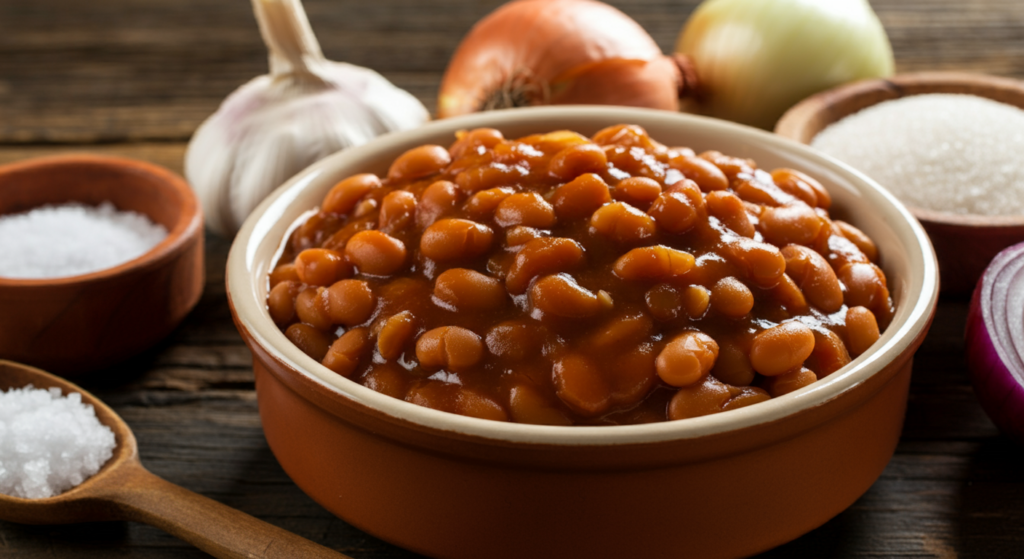
Baked Beans and Pancreatitis in Dogs
Feeding your dog the occasional baked bean is unlikely to cause significant harm. However, regular consumption can increase the risk of pancreatitis, a painful condition in which the pancreas becomes inflamed. While the exact cause of pancreatitis is not always known, certain dietary factors, such as high-fat or high-sugar foods like baked beans, can contribute to its development.
Pancreatitis can present with a range of symptoms, including vomiting, diarrhoea, increased thirst, loss of appetite, lethargy, a swollen or tender abdomen, fever, and an abnormal posture such as arching of the back due to pain. These symptoms can also be linked to other conditions, so it’s important to consult your veterinarian if you notice any of these signs.
To reduce the risk of pancreatitis, it’s best to limit your dog’s exposure to baked beans and other unsuitable human foods. Instead, focus on providing a balanced diet specifically designed for their nutritional needs. If you suspect your dog is experiencing pancreatitis, seeking prompt veterinary advice is essential.
Safer Alternatives to Baked Beans
Can I feed my dog baked beans? No, but you can offer them safe alternatives:
- Green Beans: Packed with nutrients and low in calories.
- Plain Kidney Beans: A protein-rich snack when cooked and unsalted.
- Chickpeas: Another safe option when prepared without seasoning.
What people ask: Questions and Answers
- Can dogs eat Heinz baked beans?
- No, Heinz baked beans contain harmful ingredients like sugar and salt.
- Why can’t dogs eat canned beans?
- Canned beans often have preservatives, spices, and high sodium levels.
- Can dogs eat baked beans and eggs?
- While eggs are safe, baked beans are not.
- What beans are toxic to dogs?
- Raw kidney beans, baked beans with spices, and any beans with onions or garlic.
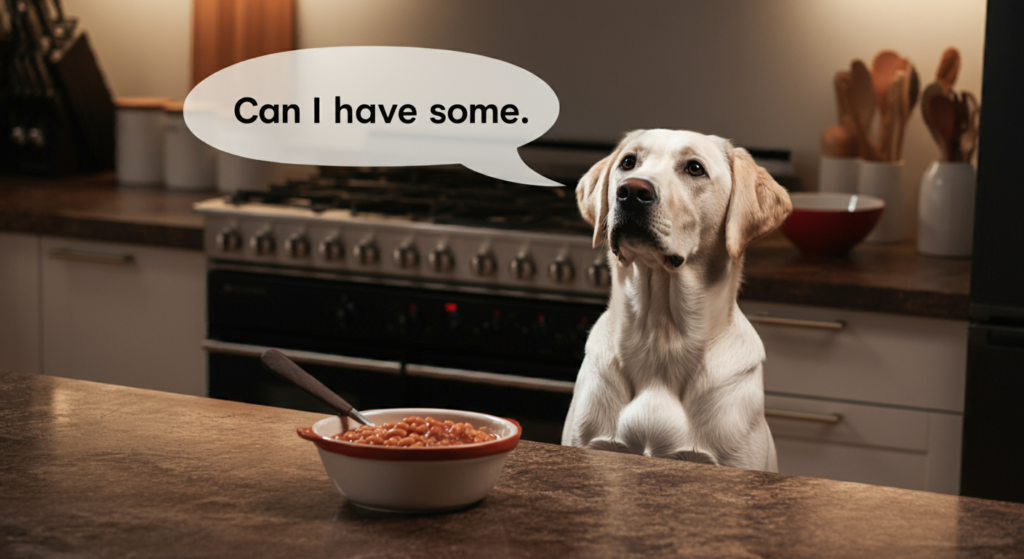
Conclusion
While baked beans are a favourite for humans, they’re not suitable for dogs due to their high sugar, salt, and toxic ingredient content, which can pose significant health risks. Sharing food with your furry friend is a loving gesture, but it’s crucial to prioritise their health by choosing options specifically suited to their dietary needs. Instead of baked beans, opt for safe, plain beans like green beans, chickpeas, or unsalted kidney beans, which provide nutritional benefits without the harmful additives. By making informed choices, you can ensure your pet stays healthy, happy, and full of energy for years to come.
10 Fun Facts About Baked Beans
- Centuries-Old Origins
Baked beans trace their roots to Native American cooking, where beans were slow-cooked with maple syrup and animal fat in clay pots over an open fire. - Not Always “Baked”
Despite the name, most commercially produced baked beans are actually steamed during production, not baked. - The Boston Nickname
Boston, Massachusetts, is often called “Bean Town” because baked beans cooked in molasses were a staple dish for the early settlers. - Heinz Dominance
Heinz baked beans, first sold in 1901, are one of the most popular varieties globally and have become a cultural icon in the UK. - World Record Bean Bath
In 2019, a man from the UK sat in a bathtub filled with baked beans for over 100 hours, setting a Guinness World Record. - Beans Aren’t the Only Ingredient
The classic baked beans recipe often includes navy beans, sugar, molasses, tomato sauce, and spices—but recipes can vary widely across cultures. - Packed with History
Baked beans were a vital food for early sailors because they were easy to store and didn’t spoil on long sea voyages. - Musical Side Effect
The phrase “beans, beans, the musical fruit” is well-known thanks to the natural effect of beans on digestion, causing gas due to their high fibre content. - Astronaut-Friendly Food
NASA includes baked beans in some astronaut menus because they are nutritious and lightweight for space travel. - Cultural Variations
In the UK, baked beans are often served on toast as a comfort food, while in the US, they are typically a BBQ side dish flavoured with brown sugar or bacon.
